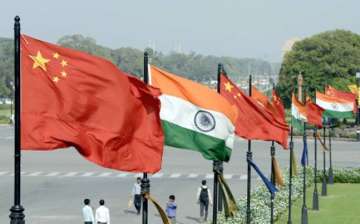Chinese actions in Sikkim have 'serious security implications', says India as Bejing reiterates 'indisputable sovereignty'
India said on Friday that it has told China that the building of a road by Chinese troops in a border region will have "serious security implications."

India said on Friday that it is deeply concerned at recent Chinese actions in Doklam area in Sikkim and warned Beijing that the building of a road by its troops in a border region will have "serious security implications for India." Through a statement from the Ministry of External Affairs, India urged China "not to change the status quo unilaterally".
"India is deeply concerned at the recent Chinese actions and has conveyed to the Chinese government that such construction would represent a significant change of status quo with serious security implications for India," an MEA statement said.
The Indian statement came even as China sought a "meaningful dialogue" over the border row and asked it to withdraw its troops from Doklam, insisting that Beijing has "indisputable sovereignty" over the area.
"Diplomatic channels are unimpeded between India and China for talks on the standoff in Sikkim," Chinese Foreign Ministry spokesman Lu Kang said. "The pressing issue is to have a meaningful dialogue for the withdrawal of Indian troops from the Doklam area in Sikkim sector," he said.
The MEA statement said India had underlined that New Delhi and Beijing had in 2012 reached an agreement that the tri-junction boundary points between India, China and third countries would be finalized in consultation with the concerned countries.
"Any attempt, therefore, to unilaterally determine tri-junction points is in violation of this understanding," the Indian statement said.
"Where the boundary in the Sikkim sector is concerned, India and China had reached an understanding also in 2012 reconfirming their mutual agreement on the 'basis of the alignment'.
"It is essential that all parties concerned display utmost restraint and abide by their respective bilateral understandings not to change the status quo unilaterally."
The statement said India "cherished peace and tranquillity" on the India-China border areas which "has not come easily."
The ministry said that India is committed to working with China to find peaceful resolution of all issues in the border areas through dialogue.
Stating out the "facts of the matter," the MEA said:
i. On 16 June, a PLA construction party entered the Doklam area and attempted to construct a road. It is our understanding that a Royal Bhutan Army patrol attempted to dissuade them from this unilateral activity. The Ambassador of the Royal Government of Bhutan (RGOB) has publicly stated that it lodged a protest with the Chinese Government through their Embassy in New Delhi on 20 June.
ii. Yesterday, the Foreign Ministry of Bhutan has also issued a statement underlining that the construction of the road inside Bhutanese territory is a direct violation of the 1988 and 1998 agreements between Bhutan and China and affects the process of demarcating the boundary between these two countries. They have urged a return to the status quo as before 16 June 2017.
iii. In keeping with their tradition of maintaining close consultation on matters of mutual interest, RGOB and the Government of India have been in continuous contact through the unfolding of these developments.
iv. In coordination with the RGOB, Indian personnel, who were present at general area Doka La, approached the Chinese construction party and urged them to desist from changing the status quo. These efforts continue.
v. The matter has been under discussion between India and China at the diplomatic level in the Foreign Ministries since then, both in New Delhi and Beijing. It was also the subject of a Border Personnel Meeting at Nathu La on 20 June.
A standoff erupted between the two militaries after the Indian Army blocked construction of the road by China in Doklam, a disputed territory between China and Bhutan also known as Donglong.
Of the 3,488-km-long India-China border from Jammu and Kashmir to Arunachal Pradesh, a 220-km section falls in Sikkim.